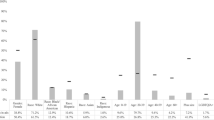Abstract
The paper distinguishes between two kinds of products, `symbolic' and `substantive'. While substantive products confer welfare utility in the sense of pecuniary benefits, symbolic products accord self-regarding utility. Symbolic products enter the utility function in a way which differs from substantive ones. The paper distinguishes among three kinds of symbolic products and proposes that each has a distorted form. If symbolic products result from forward-looking evaluation, they act as `prestige goods' which please admiration or, when distorted, as `vanity goods' which satiate pretentiousness. When symbolic products originate from forward-looking action, they act as `pride goods' which satisfy respect or, when distorted, as `deference goods' which indulge pomposity. When symbolic products arise from backward-looking evaluation, they act as `identity goods' which enhance dignity or, when distorted, as `reification goods' which gratify reverence.
Similar content being viewed by others
REFERENCES
Becker, G.S. (1974), A theory of social interactions, Journal of Political Economy 82: 1063–1093.
Becker, G.S. (1991), A note on restaurant pricing and other examples of social influence on price, Journal of Political Economy 99: 1109–1116.
Bernheim, B. (1994), A theory of conformity, Journal of Political Economy 102: 841–877.
Bikhchandani, S., Hirshleifer, D. & Welch, I. (1992), A theory of fads, fashion, custom, and cultural change as informational cascades, Journal of Political Economy 100: 992–1026.
Cosgel, M. (1994), Audience effects in consumption, Economics and Philosophy 10: 19–30.
Douglas, M. and Isherwood, B. (1979), The World of Goods, (New York: Basic).
Duesenberry, J.S. (1949), Income, Saving, and the Theory of Consumer Behavior (Cambridge,MA: Harvard University Press).
Dworkin, R. (1978), Taking Rights Seriously (Cambridge, MA: Harvard University Press).
Elster, J. (1983), Sour Grapes (Cambridge: Cambridge University Press).
Gilman, S.L. (1986), Jewish Self-Hatred: Anti-Semitism and the Hidden Language of the Jews (Baltimore: Johns Hopkins University Press).
Hardin, R. (1995), One for All: The Logic of Group Conflict (Princeton: Princeton University Press).
Hargreaves Heap, S. (1998), A note on Buridan's ass: the consequences of failing to see a difference, Kyklos 51: 277–283.
Harsanyi, J.C. (1955), Cardinal welfare, individualistic ethics, and international comparisons of utility, Journal of Political Economy 63: 309–321.
Karni, E. & Schmeidler, D. (1990), Fixed preferences and changing tastes, American Economic Review Papers and Proceedings 80: 262–267.
Katona, G. (1975), Psychological Economics. New York: Elsevier.
Khalil, E.L. (1995), The socioculturalist agenda in economics: critical remarks of Thorstein Veblen's legacy, Journal of Socio-Economics 24: 545–569.
Khalil, E.L. (1996), Respect, admiration, aggrandizement: Adam Smith as economic psychologist, Journal of Economic Psychology 17: 555–577.
Khalil, E.L. (1997a). Buridan's ass, risk, uncertainty, and self-competition: a theory of entrepreneurship, Kyklos 50: 147–163.
Khalil, E.L. (1997b), Symbolic inputs: positional, reference and publicity goods, Finnish Economic Papers 10: 20–34.
Kollock, P. (1994), The emergence of exchange structures: an experimental study of uncertainty, commitment, and trust, American Journal of Sociology 100: 315–345.
Kuran, T. (1995), Private Truths, Public Lies, (Cambridge, MA: Harvard University Press).
Lancaster, K. (1971), Consumer Demand: A New Approach (New York: Columbia University Press).
Leibenstein, H. (1950), Bandwagon, snob and Veblen effects in the theory of consumer demand, Quarterly Journal of Economics 64: 183–207.
Malinowski, B. (1922), Argonauts of the Western Pacific (New York: Dutton).
Manski, C.F. (1993), Identification of endogenous social forces: the reflection problem, Review of Economic Studies 60: 531–542.
March, J.G. & Olsen, J.P. (1976), Ambiguity and Choice in Organizations, (New York: Columbia University Press).
Morgan, J.N. (1978), Multiple motives, group decisions, uncertainty, ignorance, and confusion, American Economic Review 68: 58–63.
Ng, Y.-K. (1987), Diamonds are a government's best friend: burden-free taxes on goods valued for their values, American Economic Review 77: 186–191.
Rae, J. (1834), Statement of some New Principles of the Subject of Political Economy (Boston: Hilliard, Gray, and Co).
Pasendorger, W. (1995), Design innovation and fashion cycles, American Economic Review 85: 771–792.
Piore, M.J. (1995), Beyond Individualism (Cambridge, MA: Harvard University Press).
Posner, R.A. (1995), Aging and Old Age. Chicago: University of Chicago Press.
Schelling, T.C. (1984), Self-command in practice, in policy, and in a theory of rational choice, American Economic Review 74: 1–11.
Sen, A.K. (1980), Plural utility, Proceedings of the Aristotelian Society 80: 193–215.
Sherif, M. & Sherif, C.W. (1956), Reference groups: anchor groups for the person's ego-involvements, in Social Psychology (New York: Harper & Row) 417–437.
Simmel, G. (1904), Fashion, International Quarterly, 10: 130–155.
Smith, A. (1976), The Theory of Moral Sentiments, (Oxford: Clarendon).
Sunstein, C.R. (1997), Free Markets and Social Justice (Oxford: Oxford University Press).
Thucydides (1934), Speeches in Thucydides and Funeral Orations (London: Macmillan).
Veblen, T. (1979), The Theory of the Leisure Class (New York: Penguin).
Williams, T. (1971), The Theater of Tennessee Williams (New York: New Directions).
Author information
Authors and Affiliations
Rights and permissions
About this article
Cite this article
Khalil, E.L. Symbolic Products: Prestige, Pride and Identity Goods. Theory and Decision 49, 53–77 (2000). https://doi.org/10.1023/A:1005223607947
Issue Date:
DOI: https://doi.org/10.1023/A:1005223607947




